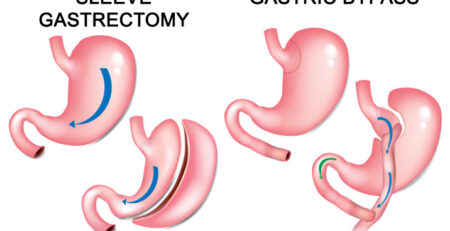POST BARIATRIC SURGERY – EXPECTATIONS AND REALITY
Bariatric or metabolic surgery is done for the obese individuals with one or more comorbidities. On average, the length of hospital stay varies from two to four days depending upon the patient conditions and the type of surgery. In majority of the cases, the patient is upon his/her own feet and can start walking on the same day of surgery. Usually, oral feeding is started within the next 24 hours of the surgery. Once the patient is tolerating the feeds, completely mobile on his/her own feet and mostly pain-free, it is time to get discharged from the hospital which usually happens by 2nd or 4th day from the surgery.

The real test for the bariatric patient begins at home. Minimal abdominal pain, some difficulty in swallowing food is expected in the initial 1-2 weeks. The feeding is gradually increased so that by around 3rd week, the patient resumes his normal diet and by this time the swallowing difficulty should completely be settled.
There are huge expectations from the patient regarding weight loss and associated illnesses. While the weight loss is going to happen, it is to be noted that it is not an overnight magic that will result in a miracle. It is a gradual process which will result in weight loss over the next 6 months to 1 year.
During this same period, there is an improvement in associated comorbidities as well. But important here is for one to understand that all this improvement is not going to happen automatically. Patient’s commitment and will power is the key to success and achieving desired goals after bariatric surgery. Commitment towards eating healthy food and restricting certain food items and minimal daily regular exercises help in achieving better weight loss and to maintain it for the long term.

Also, once the patient is discharged, he/she should have regular follow-ups with his surgeon and his dietician for a smoother post-operative course and to identify certain nutritional deficiencies which can develop in few individuals.
Patients should never compare their weight loss with other individuals who have undergone the same procedure as all individuals have different basal metabolic rate (BMR), may have different food habits and accordingly will have different weight loss patterns.
Lastly, as emphasized earlier, it is important to follow the diet and have regular physiotherapy and exercises to maintain the lost weight. It has been observed that 2-3 years later, the diet schedule becomes irregular and the exercises completely stop. Also, the patients start eating unhealthy/junk foods which might, in turn, lead to weight regain.
One should keep in the mind their ultimate health goal and keep the diet and exercises continuing regularly which should be combined with regular follow-ups with the bariatric surgeon to achieve and maintain a healthy weight for the long term.








